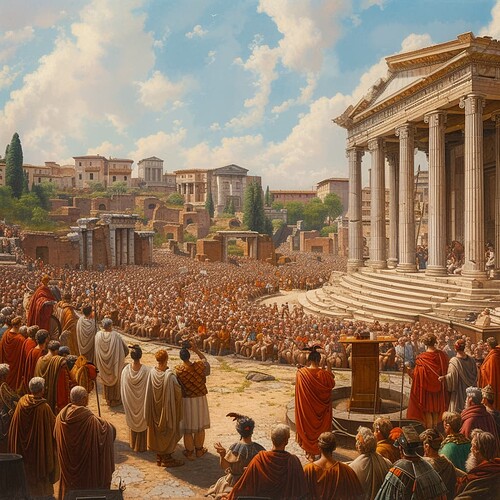 February 3: Romans 13, 14 - Governing our Actions in Love
February 3: Romans 13, 14 - Governing our Actions in Love
 Introduction
Introduction
In Romans 13 and 14, Apostle Paul navigates the intersection of culture, government, personal freedoms, and faith. He provides guidance for Christians living under a government while maintaining Christian values, and accentuates the importance of love as the ultimate guideline for behavior.
 Romans 13 - Upholding Law, Governed by Love
Romans 13 - Upholding Law, Governed by Love
![]() Key Verse: Romans 13:8: “Owe no one anything, except to love each other, for the one who loves another has fulfilled the law.”
Key Verse: Romans 13:8: “Owe no one anything, except to love each other, for the one who loves another has fulfilled the law.”
Here, Paul expresses the importance of respecting and following the law, not just as an obligation but as a matter of conscience. Yet, the overarching law - the one that governs all others - is love. This profound idea stresses the universal commandment of love above all else.
 Romans 14 - Non-Judgement in Disputable Matters
Romans 14 - Non-Judgement in Disputable Matters
![]() Key Verse: Romans 14:13: “Therefore let us not pass judgment on one another any longer, but rather decide never to put a stumbling block or hindrance in the way of a brother.”
Key Verse: Romans 14:13: “Therefore let us not pass judgment on one another any longer, but rather decide never to put a stumbling block or hindrance in the way of a brother.”
Paul addresses the disagreements between believers around disputable matters like dietary laws and special holy days. He calls for mutual respect, love, and understanding towards each other’s practices and beliefs rather than passing judgment.
 Key Themes and Reflections
Key Themes and Reflections
- Respect for authority: Paul emphasizes respecting governmental authorities. It’s important to question how this plays out today in light of oppressive or unjust governments. We are challenged to discern between lawful authority and those abusing power.
- Love surpasses law: The decree of love above law is revolutionary. It invites us to evaluate every action and decision based on whether it promotes love.
- Non-judgement and acceptance: The call for tolerance and openness towards differing beliefs within the Christian community is a timely reminder even today. We’re urged to foster unity in diversity, embodying Christ’s love.
 Today’s Application
Today’s Application
Romans 13-14 provides a blueprint for living as Christian citizens in today’s diverse world. It prompts us to respect laws, but also to act in love and understanding, and refrain from judging others’ practices.
 Hidden Gem
Hidden Gem
An interesting fact: Romans 13:1 is one of the most politically debated verses in the Bible due to its call for submission to governing authorities. This verse has been interpreted in diverse ways across history.
 Reflective Q&A
Reflective Q&A
 What does “fulfilling the law through love” mean to you?
What does “fulfilling the law through love” mean to you?
- A: It could mean that acting in genuine love and kindness automatically aligns with God’s laws and commands.
 How can we balance respect for authority with standing against injustice?
How can we balance respect for authority with standing against injustice?
- A: We can respect laws that are just and promote goodwill, while peacefully and courageously standing against laws that are oppressive.
 How can we apply the principle of non-judgment in our lives today?
How can we apply the principle of non-judgment in our lives today?
- A: By embracing diversity, seeking understanding before critique, and prioritizing unity and love in our relationships.
 Join the Discussion
Join the Discussion
We invite you to share your reflections on today’s readings. How do these chapters speak into your life? How does ‘acting in love’ affect your everyday actions?
 See You Tomorrow in Romans 15, 16
See You Tomorrow in Romans 15, 16
Tomorrow, we’ll explore Paul’s passionate desire to preach the gospel where it had not been heard and his plans for his mission journey. As we dive further into Romans, let’s remember to guide our actions with love, the ultimate law of the Christian faith.
